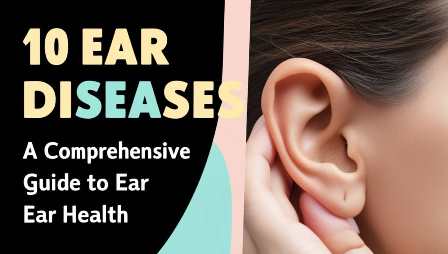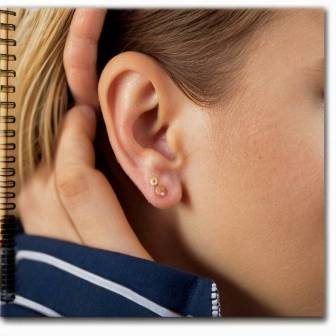10 Ear Diseases Introduction:
Welcome to our extensive reference on ear health. From listening to your preferred music to keeping you in touch with the surroundings, your ears are very vital in every day living. General well-being depends on your understanding and taking care of your hearing.
In this guide, we will go through the nuances of ear health, discuss 10 common ear disorders, provide ideas to improve inner ear health, suggest supplements, and offer answers for different ear issues.
Understanding Ear Health:
Ear health is multifaceted, encompassing various aspects beyond just hearing. It involves the intricate balance of maintaining a clean, infection-free environment while ensuring optimal functioning of the auditory system.
This section will provide you with a holistic perspective on how to maintain healthy ears and address potential issues promptly.
How To Improve Inner Ear Health:
Maintaining healthy ears includes some essential exercises.
- First of all, cleanliness is important.
Clean your ears gently with a damp cloth, avoiding cotton swabs which can push the wax deeper. - Protect your ears from loud noises
By using earplugs or turning down the volume of headphones in noisy environments. - Regular checkups with an audiologist can ensure early detection of any potential problems.
- Additionally, avoiding exposure to water during activities such as swimming, using earplugs, or thoroughly drying the ears after exposure to water helps prevent infections.
- Finally, lead a healthy lifestyle, as good overall health contributes to ear health. These exercises promote ear health and can help prevent many common ear problems.
10 Ear Diseases:
Exploring the spectrum of 10 ear diseases reveals the complex challenges that affect ear health. Understanding these conditions becomes important in promoting comprehensive ear health and proactive care strategies.
1.Otitis Media:
Otitis media refers to middle ear infections, often prevalent in children. Symptoms include ear pain, fever, and sometimes, discharge. Treatment involves antibiotics and pain management.
2. Tinnitus:
Tinnitus manifests as a persistent ringing, buzzing, or hissing sound in the ears. While it doesn’t have a specific cure, various therapies and techniques can help manage its impact on daily life.
3. Ear Infections:
Infections in the ear can impact various parts, including the outer, middle, or inner ear. Pain, swelling, and sometimes hearing impairment are common symptoms. Timely medical attention is crucial for proper treatment.
4. Meniere’s Disease:
Meniere’s Disease brings vertigo, fluctuating hearing loss, and tinnitus. Lifestyle changes, medication, and in severe cases, surgery, may be part of the management plan.
5. Hearing Loss:
From age-related to noise-induced hearing loss, preserving hearing health is crucial. Prevention through ear protection and regular check-ups is key.
6. Earwax Buildup:
Excessive earwax can cause discomfort and hearing issues. Gentle cleaning methods and avoiding cotton swabs can help manage this condition.
7. Vertigo:
Vertigo leads to a spinning sensation, often due to inner ear issues. Techniques like vestibular rehabilitation may aid in managing this condition.
8. Barotrauma:
Barotrauma occurs due to pressure changes, such as in airplanes or scuba diving. Swallowing, yawning, or specialized earplugs can mitigate discomfort.
9. Swimmer’s Ear:
This infection arises from water exposure, causing pain and swelling in the outer ear. Drying ears post-swimming and using ear drops can prevent it.
10. Acoustic Neuroma:
A noncancerous tumor that affects the inner ear, causing hearing loss and imbalance. Available treatments vary from close monitoring to surgical intervention.
Tips for Enhancing Inner Ear Health:
Maintaining inner ear health involves adopting healthy habits and incorporating essential nutrients into your diet. Here are some tips:
Balanced Nutrition: Include foods rich in vitamins like A, C, E, and magnesium to support ear health.
Supplements: Consider supplements containing these vitamins or minerals, promoting optimal ear function.
The Science Behind Ear Health Supplements
Research shows that antioxidants like vitamins C and E combat age-related hearing loss. Minerals such as magnesium and zinc contribute to the maintenance of the structure of the inner ear.
Here are some ear health supplements that are often associated with promoting ear health:
Omega-3 fatty acids: These fatty acids, found in fish oil, have anti-inflammatory properties that may benefit the ears.
Magnesium: Known for its ability to reduce the risk of hearing damage caused by loud noises.
Vitamin B12: Helps maintain the health of the nerves associated with the ear.
Zinc: Supports the immune system, potentially reducing the risk of ear infections.
Vitamin C: Known for its antioxidant properties that may help prevent age-related hearing problems.
Always consult a health care professional before starting any new supplement regimen, especially for ear health.
Alleviating Ear Pain from Allergies: Over-the-counter antihistamines or saline nasal sprays can relieve ear pain linked to allergies.
Ear Care Beyond Diseases:
Caring for your ears goes beyond treating specific conditions:

Ear Care After Piercing:
Taking care of your ear care after piercing is important to prevent infection and promote proper healing. Here are some tips for care after ear piercing:
Cleanliness: Wash your hands thoroughly before touching the pierced area. Use saline solution or a gentle cleanser recommended by your piercer to clean the piercing at least twice a day.
Avoid irritants: Keep hair products, makeup, and other cosmetics away from the piercing until it has completely healed to avoid irritation.
Avoid twisting the jewelry: Contrary to popular belief, constantly twisting the earrings can hinder the healing process. Move the jewelry only if necessary for cleaning and do so gently.
Avoid swimming: Stay away from pools, hot tubs, and bodies of water such as lakes or oceans until the hole heals to prevent infection from bacteria present in the water.
Do not remove jewelry prematurely: Wait until the hole has completely healed before changing or removing the earrings. Removing jewelry too early may cause closure or complications in healing.
Be patient: Healing time varies but usually takes several weeks to a few months. Follow your piercer’s advice and be patient with the healing process.
Remember, if you notice excessive redness, swelling, pain, or discharge, it is essential to contact your piercer or health care professional as this may be a sign of an infection that needs attention.
Sustainable Ear Care Habits: Regularly check for earwax buildup and gently clean the outer ear. Avoid using cotton swabs inside the ear canal.
FAQs On 10 Ear Diseases: A Comprehensive Guide to Ear Health
1. What are the common symptoms of ear infection?
2. Can accumulation of earwax cause hearing problems?
3. How can one prevent swimmer’s ear?
4. What causes tinnitus and can it be treated?
5. Are there any preventive measures for hearing loss?
6. What is Meniere’s disease and how is it managed?
7. Can barotrauma be prevented during flights or scuba diving?
8. Is hearing loss reversible?
9. Can ear infections occur in adults, or is it more common in children?
10. How can ear pain caused by allergies be reduced?
11. What is acoustic neuroma and how is it managed?
12. Are there any natural remedies for vertigo?
13. Can age-related hearing loss be prevented?
14. Is it safe to remove earwax at home?
15. What precautions should be taken for ear care after ear piercing?
After getting your ears pierced, maintain hygiene by cleaning the area with saline solution twice a day. Avoid excessive twisting or bending of earrings to avoid irritation and infection.
Ultimately, understanding the landscape of 10 ear diseases is fundamental to prioritizing overall ear health. To enhance inner ear health, consider integrating ear health supplements and vitamins.
Additionally, adopting proper ear care practices, especially after ear piercing, contributes significantly to the continued health and well-being of the ears. Remember, proactive and attentive care is the key to preserving your ears for a lifetime of rich experiences.


